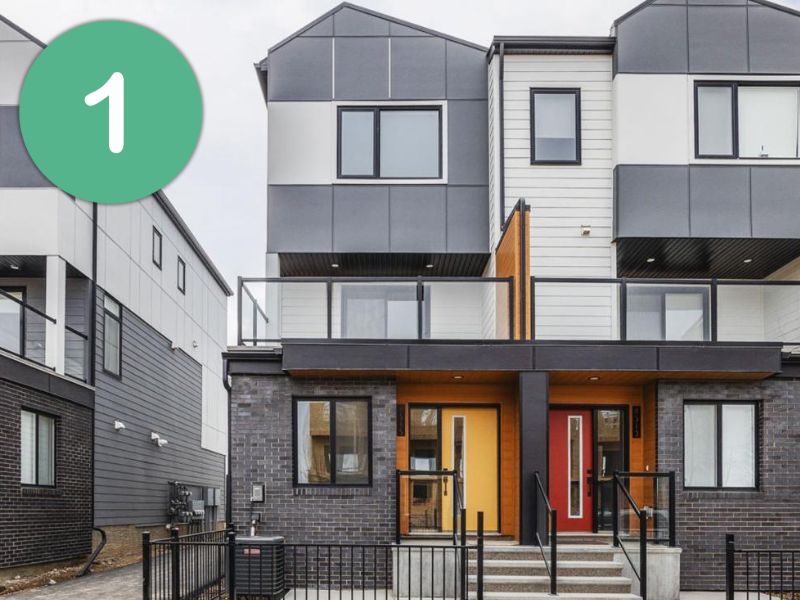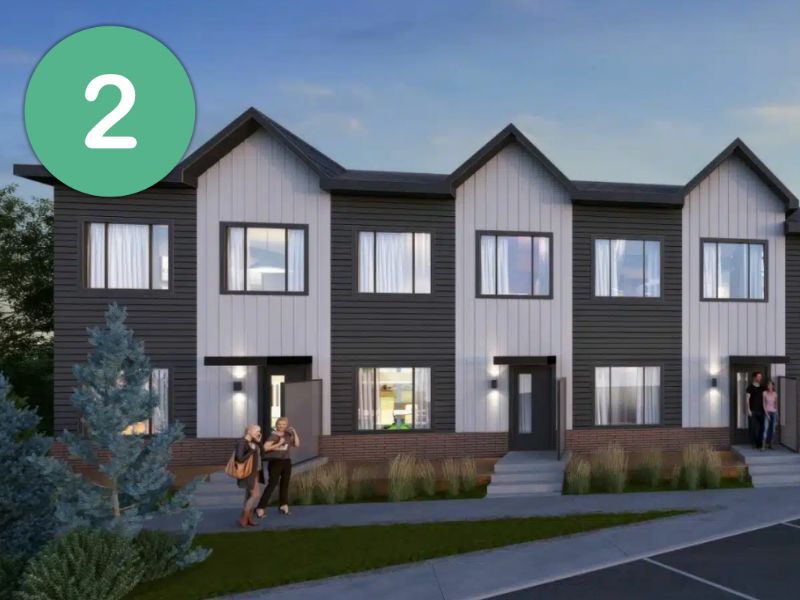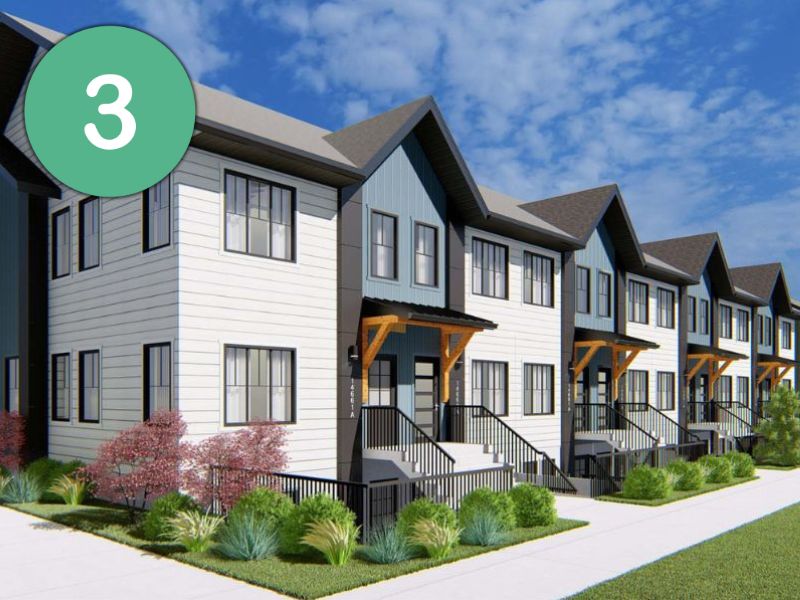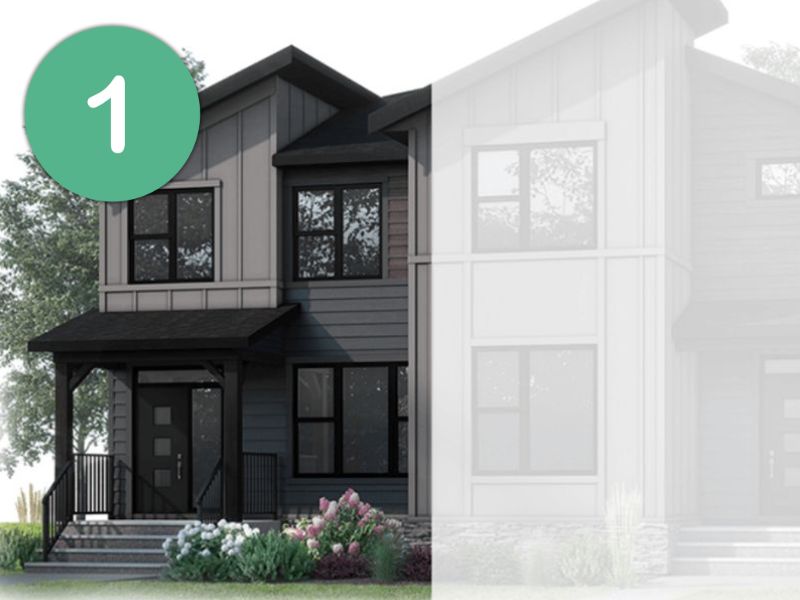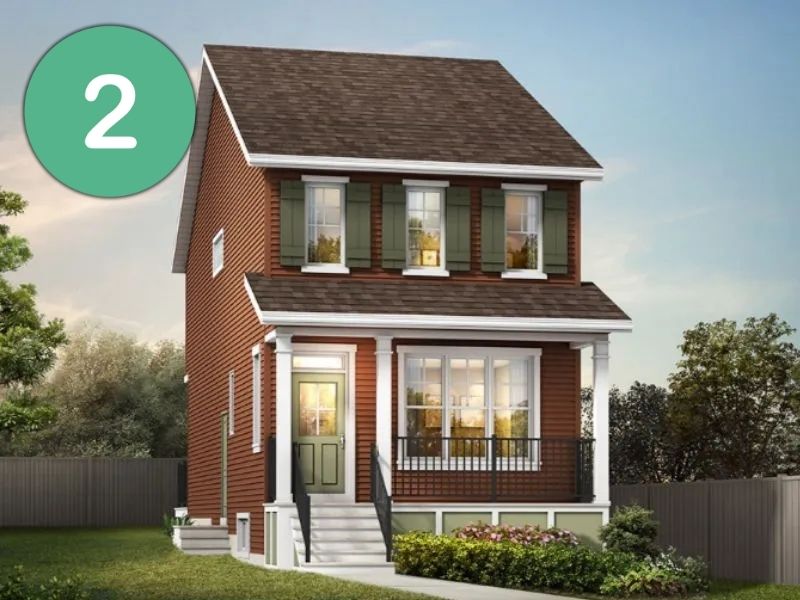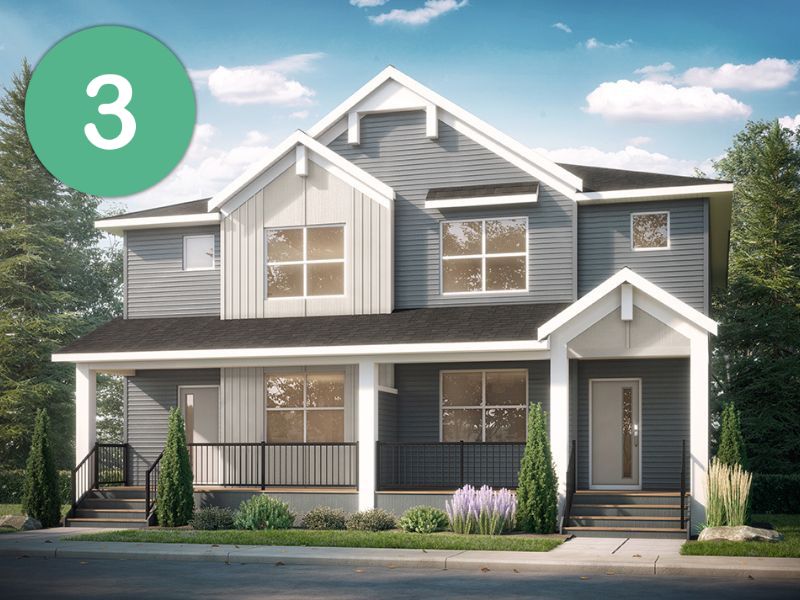PRECONSTRUCTION INVESTING
Best Preconstruction Investments in Calgary for January 2025
Hand picked investment opportunities before anyone else...
2 Bedroom, 2 Bathroom Legal Suite!
Rare Investment Opportunity - Get Early Access Today!
- Details: 1667 SqFt, 3 Bed 2.5 bath main living. 702 SqFt, 2 Bed 2 Bath Legal Suite
- Pricing: About $705k including GST
- Condo Fees: None. These are freehold.
- Cashflow Projections: With the 2 bed, 2 bath legal suite the estimated monthly cashflow is $882/Month
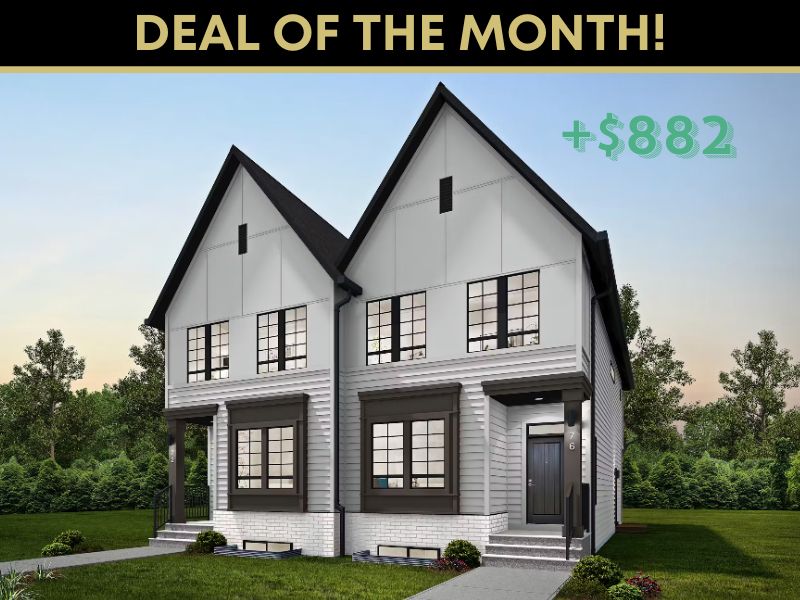

Top Preconstruction Townhomes in Calgary
Calgary pre construction townhomes for under $500K - *Rare Find*
Renaming the development to "East Hills Crossing.
Starting at $490K
2 Bed | 2.5 Bath | 1303 Sq Ft
- Deposit: 10% Total with flexible deposit structure: $10k due at firm
- Expected Possession: Fall of 2025
- Parking: Attached Single Car Parking
- Condo Fees: ~$177 - $191 / month
- Assignment Friendly
NW Calgary
Starting at $419K
2 Bed | 2.5 Bath | 1060 Sq Ft
- Location: One of Calgary's Most Prominent Communities in the NW
- Currently one of the few new townhome projects under $500k
- Investment Style: Tremendous appreciation potential
- Deposit Structure: Only 10% down required at firming
NW Calgary Townhomes
Starting in the low $400K's
2 Bed | 2.5 Bath | 1090 Sq Ft
- Deposit Structure: 5% for residential buyers. 10% down for investors.
- Expected Possession: Spring 2025
- Environmentally Friendly: These are high efficiency homes giving it a uniqueness
- Current Phase: 3
- Phase 1 and 2 completely sold out

Top Cashflow Preconstruction Homes in Calgary
Calgary pre construction homes with legal suites for cashflow positive investments
Semi Detached in Cochrane
Starting at $640K (Including GST)
Monthly Cashflow Projection:
+$739/Month
- Type: Freehold Duplex with a Side Door Entrance
- Availability: 10 lots currently available as of August 26, 2024
- Possession Date: ~ 9 – 12 MONTHS
- Price W/O Legal Suite: Approximately $560,000 (including GST)
- Price W Legal Suite: $640,000
- Must develop Legal Suite After Build
SE Laned Homes -2 Bedroom Legal Suite
Starting at $670K
Monthly Cashflow Projection:
+$620/Month
- Price: ESTIMATED $630K (Without legal suite add on)
- Legal Suite: ESTIMATED $670K-700K with fully developed legal suite
- Current Incentive: *50% Off Legal Suite, or $30K off the total price.
- Freehold (No condo fees)
- Assignment Friendly
South Semi Detached - 2 Bedroom Legal Suites
Starting at $690K
Monthly Cashflow Projection:
+$320/Month
- 2 Bed Legal suite: Approx. 95K with separate gas meters, electrical panels/meters and hot water tanks/meters.
- No Condo Fees⠀
- Only 3 Units Available* (Updated 09-26-24)
- Possession Date: ~ 9 – 12 MONTHS
- STRONG POTENTIAL FOR APPRECIATION
What You Need to Know About Investing Remotely In Calgary
Investing from out of province works the same as if you were standing in Calgary in-person yourself and everything can be done remotely, including management of the unit! You never have to go to Calgary or even see the unit you purchased.
Once you’ve decided on a unit, simply submit a Suite Reservation Form or “Worksheet” containing necessary details such as your legal name, address, contact information, occupation, employer, and a valid identification photo (usually a driver’s license or passport). This aids the developer in preparing the purchase agreement and helps me keep track of additional preferences like parking, locker purchase, multiple purchasers, or the inclusion of a Holding Company in the agreement.
In some cases, time is of the essence, requiring swift action within minutes to secure your unit. Pre-submitting a unit registration form allows for instant reservation, bypassing potential delays associated with waiting for form submission. The process is quick, taking less than 5 minutes to complete. Access the form here:
Upon receipt of your submitted information, the developer promptly generates your purchase agreement, often completing the Agreement of Purchase and Sale (APS) within 24 hours due to its largely automated nature. It’s crucial to sign the agreement within 24 hours of receiving it, as failure to do so may result in the developer voiding the contract and reclaiming the unit. This practice helps sift out individuals who are not genuinely committed to the purchase process and initiates the “clock” for the 10-day cooling period.
In the fast-paced world of real estate, some developments can sell out within mere hours, leaving little time for thorough due diligence. Thankfully, Alberta law provides a safety net in the form of a 10-day cooling period, allowing buyers to back out of a deal without penalty for any reason. This 10-day period, which includes weekends and holidays, begins the day you sign the agreement. Should you choose to exercise this option, simply send an email to the builder to inform them of your decision to withdraw from the purchase – no complicated forms required.
While not mandatory for purchasing a pre-construction property, engaging a lawyer at closing is advisable. It’s prudent to have your purchase agreement reviewed within the cooling-off period to ensure there are no deal-breaking clauses or terms you find unacceptable. Despite limited room for negotiation, legal insight can be invaluable, given that contracts typically favor the developer’s interests.
In Alberta, where nuances in real estate law vary from other provinces, a lawyer familiar with local regulations can provide essential guidance. For instance, terms like “duplex” and “occupancy” may carry different meanings across jurisdictions. Additionally, to facilitate property closure, your lawyer must have access to the province’s land titles registration system. If you already have legal representation, it’s worth confirming their capabilities; otherwise, I can assist in referring you to a suitable lawyer.
When purchasing a pre-construction unit, securing a mortgage is only necessary at the closing stage, not during the initial purchase. In Alberta, the mortgage application process mirrors that of other provinces, with major banks and financial institutions operating nationwide.
Although an actual mortgage is obtained at closing, many developers require a mortgage pre-approval within the cooling-off period. This preliminary approval assesses your financial status, including employment, income, debts, and real estate holdings, without conducting a credit score check.
Obtaining a mortgage pre-approval should be your first step before exploring properties, as it determines your borrowing capacity and budget. It’s crucial to align your property search with your financial capabilities to avoid disappointment.
The actual mortgage financing is contingent upon your financial situation at closing, which could be several years away. Due to Covid-related delays, banks may experience backlog, underscoring the importance of early mortgage organization to avoid penalties and fees.
While not all mortgage brokers can facilitate mortgages in Alberta, I collaborate with trusted partners who can assist seamlessly. Feel free to reach out for a referral if needed.
It’s important to note that for traditional mortgages from any bank in Canada, a minimum 20% down payment is required for rental properties. If you’ve put down a 10% deposit with the developer, you’ll need to provide an additional 10% at closing, as all deposits count towards the 20% requirement. Any claims of less than 20% down payment typically apply to owner-occupied homes requiring CHMC insurance or may be misleading.
While some developers may accept post-dated personal cheques, in most cases, deposits must be made using one of the following methods:
Wire Transfer: Visit your local bank to wire the funds directly to the developer’s lawyer, incurring approximately a $50 fee.
Bank Draft (MOST COMMON): Obtain a bank draft from your local bank and deposit it into the developer’s lawyer’s bank account, typically BMO or TD, with a cost of about $8.
Deposits are safeguarded by provincial law and held in-trust by the developer’s lawyer. In the event of building cancellation or developer bankruptcy, your deposits are protected, ensuring their return.
Please Note: I am not a tax expert, so I recommend consulting with your accountant for personalized advice.
In Alberta, buyers from other provinces do not incur any special taxes or fees. Alberta offers several advantages for real estate investment:
• NO FOREIGN BUYER TAX: Regardless of residency, Canadian citizens and permanent residents can purchase real estate in Alberta without paying any special “foreign” taxes.
• NO LAND TRANSFER TAX: Unlike in provinces like BC and Ontario, Alberta does not impose specific taxes related to real estate transactions. This results in significant savings, such as avoiding the hefty $32,950 tax on a $1M property sale in Toronto. There is only a nominal Property Registration Fee, typically a few hundred dollars.
• NO DEVELOPMENT CHARGES: Unlike other regions, Alberta, particularly Calgary, does not levy development charges, which are essentially taxes imposed by local municipalities to fund infrastructure projects.
• NO PROVINCIAL SALES TAX: Alberta imposes only a 5% sales tax on goods and services purchased, making it an attractive location for buyers.
Regarding income taxes on property appreciation upon sale, the rules are determined by the Canada Revenue Agency (CRA), a federal entity. The treatment of income and capital gains is uniform across provinces.
All new homes in Alberta are covered by the Alberta New Home Warranty Program – this provides coverage for a 10 year period:
• 1 YEAR – MATERIALS & LABOUR: Coverage for defects in materials and labour (baseboards, flooring, trim, and paint).
• 2 YEAR – DELIVERY & DISTRIBUTION SYSTEMS: Coverage for defects in materials/labour related to delivery & distribution systems (heating, electrical and plumbing systems).
• 5 YEAR – BUILDING ENVELOPE: Coverage for defects in the system of components that separate the conditioned space from unconditioned space (roof, exterior walls).
• 10 YEAR – STRUCTURAL: Coverage for the load-bearing parts of the home (frame, foundation).
Prior to closing on the unit, there will also be an Occupancy Inspection to walkthrough the property to inspect for any deficiencies. You can do this yourself, you can send someone anyone to do it on your behalf, or you can have a building designate walk you through the inspection remotely on a Zoom call. There are always “deficiencies” that the builder will fix and touch up and some seasonal items and exterior work may not be able to be completed until later (e.g. pouring concrete, landscaping, etc.)
Many of my clients invest in units located outside their residing cities. While some opt to manage their units independently, the convenience of online ordering makes this feasible, especially for condos where issues typically involve a plumber or locksmith.
For remote investors, hiring a property management company is often the wisest choice. These professionals handle tenant communications, payments, compliance with statutory regulations, maintenance, repairs, and day-to-day management, requiring your involvement only for major decisions or invoice payments.
In Alberta, property management fees typically amount to 10% of gross rent plus GST, although rates as low as 6% are not uncommon. I advise using 10% for financial analysis purposes.
For clients who prefer a hands-on approach, I suggest initially managing the unit independently for a few months to gauge feasibility. Should challenges arise, you can always enlist the services of a property manager later.
In Alberta, rental units are primarily managed by property management companies, unlike Ontario and BC where real estate agents often handle rentals. These companies oversee the listing, advertising, and coordination of showings, as well as conduct due diligence on prospective tenants, including employment verification, reference checks, social media screening, and credit score assessment. The standard charge for their services is typically 1/2 of a month’s rent plus GST, whereas in the Greater Toronto Area (GTA), it’s typically a full month’s rent.
Your role in the rental process should mainly involve reviewing the due diligence provided by the property management company for prospective tenants and giving your approval.
At the time of closing, all associated activities can be conveniently conducted remotely, including signing paperwork with the lawyer, coordinating the mortgage with the broker, organizing insurance, and taking possession of the unit and keys.
Closing costs, which encompass the fees and expenses linked to transferring legal title to your name, vary significantly between Ontario/BC and Alberta. Below is a comparison of closing costs for a $500,000 one-bedroom pre-construction condo in Calgary versus Toronto:
TYPICAL CLOSING COSTS IN CALGARY:
- Land Transfer Tax: $0
- Development Charges: $0
- Lawyer & Legal Fees: $1,250
- Title Insurance: $250
- Registration Fees: $420
- GST Rebate: $0*
- TOTAL: $1,920
CLOSING COSTS IN TORONTO:
- Land Transfer Tax: $12,950
- Development Charges: $15,000
- Lawyer & Legal Fees: $1,000
- Title Insurance: $200
- Miscellaneous Fees: $1,500
- HST Rebate: $24,000**
- TOTAL: $54,650
- There is a 36% GST rebate up to $6,300 in Alberta, but it’s subject to a sliding scale and completely phased out at $450k.
** Upon renting out the unit for at least a one-year term in Ontario, you can apply for the HST Rebate, and it’s common to receive the full $24k rebate, making it more of a cash flow issue than a true expense.
Contact Information
View ListingsSeton Townhomes - Rohit
Starting in the low $400's
Project Overview:
” Seton is a master-planned community designed to be a new urban hub. The South Health Campus, Calgary Public Library, restaurants, shops and even a skatepark make it a destination for people living in south Calgary.
In May 2022, Seton won BILD Calgary’s Best Community of the Year for the second year in a row. We’re honoured to win twice, and happy that the Seton Urban District is being recognized as a great place to live and work.”

